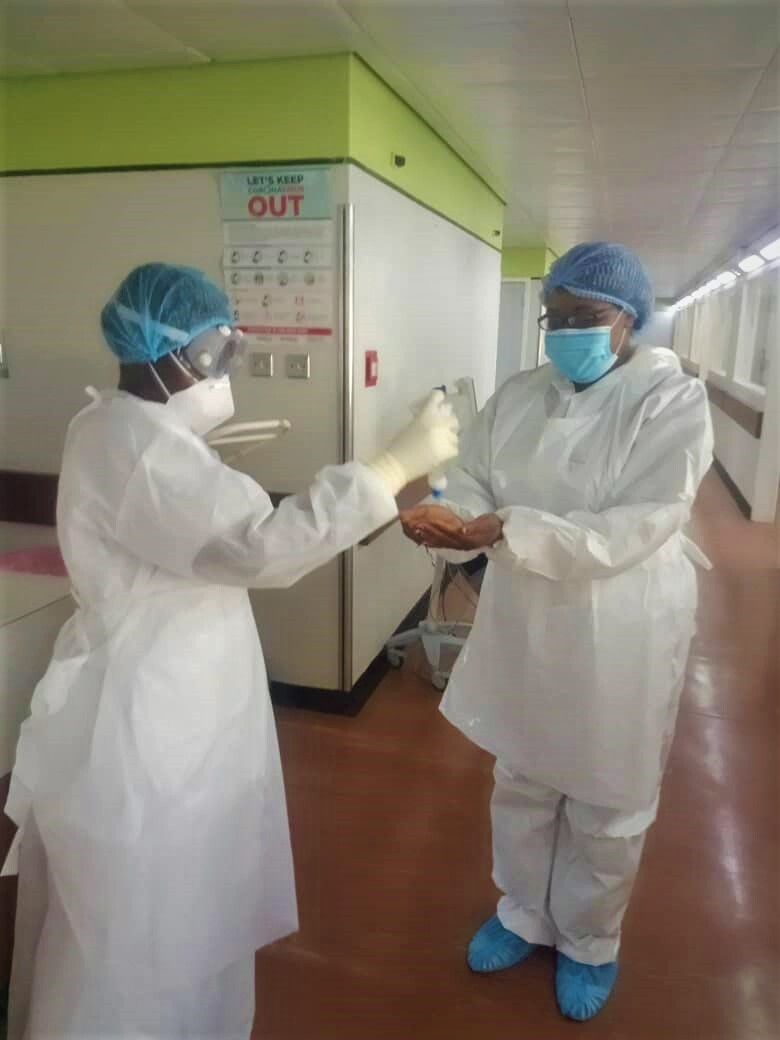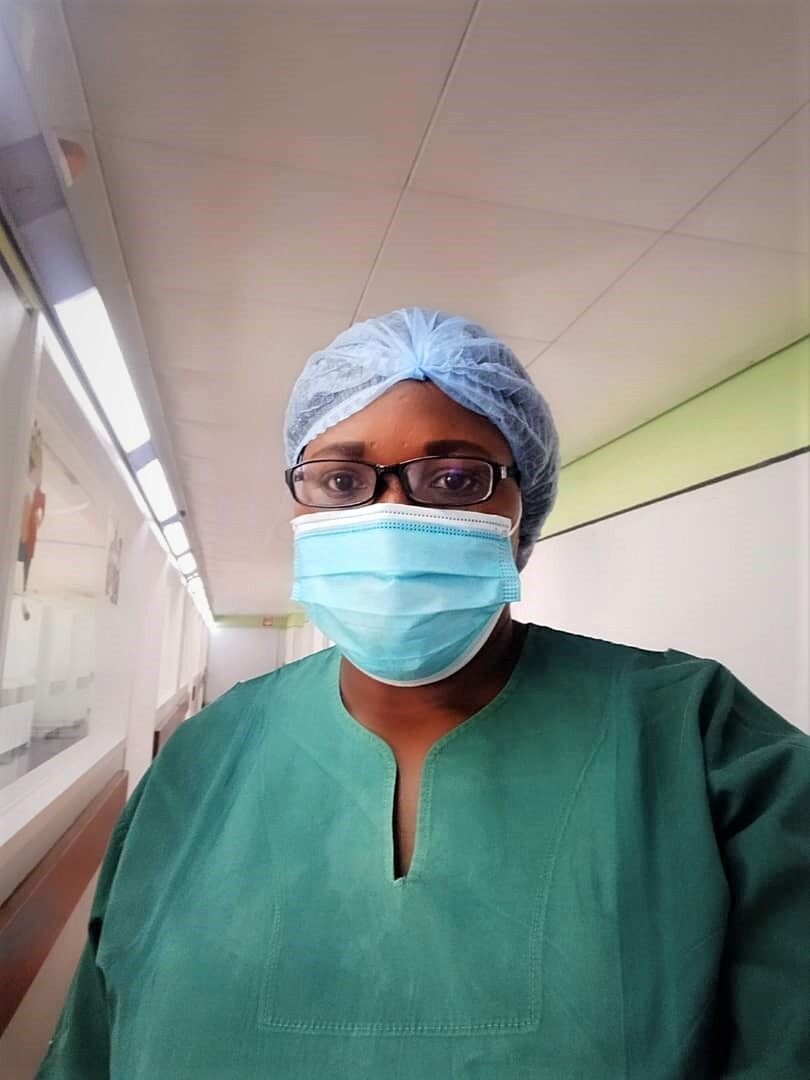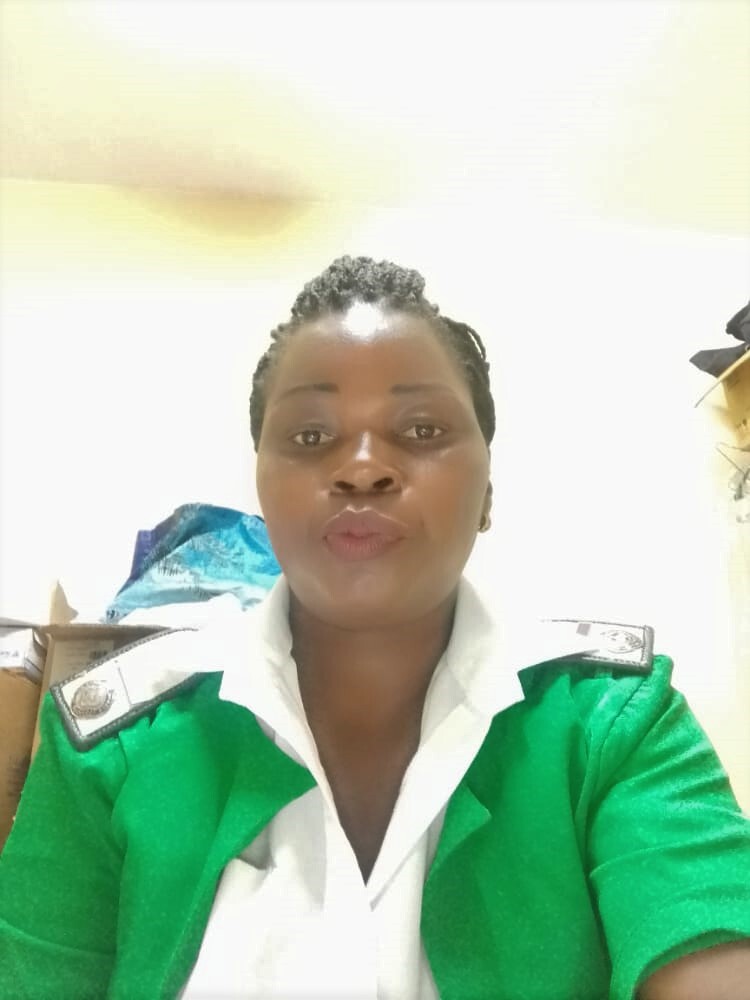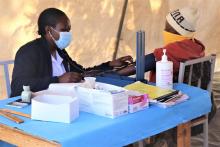Inspiring role of nurses and midwives’ on the COVID-19 frontline in Zimbabwe

By Tatenda Chimbwanda
To be a nurse and a midwife means to be of service no matter the circumstances. Nurses and midwives in Zimbabwe are not just health workers, they are mothers, sisters and leaders in their communities. In honor of nurses and midwives’ commitment to their profession WHO designated 2020 as the “International Year of the Nurse and the Midwife,” prior to the COVID-19 pandemic.
Nurses and midwives continue to be on the front line fighting COVID-19 daily and providing essential health services. This puts them at high risk of contracting communicable diseases including COVID-19.
In order to reduce health care risk of infection during the COVID-19 pandemic, WHO in partnership with Ministry of Health and Child Care (MoHCC), Africa Centres of Disease Control and Prevention (Africa CDC) and Infection Control Association of Zimbabwe (ICAZ) conducted a two-day Integrated Infectious Prevention Control (IPC) and Case Management workshop in Mutare for health care workers from different provinces across Zimbabwe. The main objective of the training was to strengthen the capacity of health institutions to respond and reduce the spread of COVID-19 in Zimbabwe.
Ever wondered what it feels like to be a nurse and midwife during the COVID-19 pandemic? Below are a few inspiring stories from health workers who received WHO led IPC/Case management training in Zimbabwe;
Margret “the COVID-19 Master”
Margret Gwanzura is a mother of four, grandmother of five, a pastor, a business woman, counselor and most importantly a dedicated midwife at Marondera General Hospital. She began her career 30 years ago in 1981 at Mutare Hospital. In 1985, she also trained as a registered counselor for HIV/AIDs patients. To date she has provided counselling for more than 85 patients.
Margret is in charge of the maternity ward and continues to provide care for pregnant mothers and new born babies during the COVID-19 pandemic. Margret has now attained a third role due to COVID-19. She is responsible for leading the maternity ward IPC measures implementation. She also oversees that her staff is adhering to all IPC related Standard Operating Procedures (SOPs) when delivering essential health services. The SOPs are guided by WHO recommendations and outlines procedures to follow such as how to put on appropriate Protective Personal Equipment (PPE) when delivering a baby.
Soon after WHO’s integrated IPC/ case management training Margret immediately trained her staff on the new knowledge she had acquired. “I learnt that hand hygiene is very important in preventing the spread of infections in the maternity ward,” said Margret.
As a result of the information she received during the training, Margret has added additional hand washing facilities in the maternity ward. She has also made it compulsory for her staff to ensure patients are regularly washing their hands in all the hospital wards, including conducting practical lessons on the correct hand hygiene technique to follow when washing hands.
Margret continues to encourage her staff to share information on the best IPC measures with patients as they deliver essential health services.
The training was extremely eye opening for Margret who said, “l learnt that you cannot wear the same mask the whole day. It actually increases your chances of infecting yourself.”
The former, is something Margret was not aware of. With the shortages of PPE in Zimbabwe, her staff used to wear the same masks every day. This is a practice she had to immediately ban as soon as she got back from the training.
Margret is now aware of how the IPC measures she adheres to at the hospital should continue at home as well.
“If I get sick, I will put so many other people at risk, including my staff, family and patient’s I attend. Therefore, I remain guided by WHO’s IPC guidelines on duty and off duty,” added Margret.
One of the practical examples which stuck with Margret from the workshop was how simple actions can protect her from being infected. “When I approach the road blocks these days, I no longer hand over my license to the police. I hold it myself and present it to them to avoid contact,” explains Margret.
Although Margret and her staff are not looking after any COVID-19 positive patients, her staff’s exposure to the virus has not decreased. Margret always emphasizes the importance of treating everyone in the hospital like they are infected.
In addition, a number of mothers have tested COVID-19 positive in her maternity ward. While in the maternity ward, she takes care of them before they are transferred to the referral hospital, Wilkins Infectious Disease Hospital in Harare with capacity to admit moderate to serve COVID-19 cases.
“This means my staff and myself are at great risk of contracting COVID-19, as much as those looking after COVID-19 patients at Wilkins Hospital,’’ added Margret.
Being a nurse during COVID-19, has been the scariest period of Margret’s career. The lack of PPE does not make matters easy for her. However, Margret remains resolute and says: “We just need to keep going during these hard times and l believe we will overcome and make do with the limited resources we have.”
The mothers who test COVID-19 positive are extremely anxious and nervous. “I am glad that I have experience in counselling. I always ensure the mothers understand COVID-19 is not a death sentence and keep them encouraged,” she says.
The COVID-19 pandemic has drastically changed Margret’s personal life as well. She had to close the small shop she owned which sold wedding accessories. Three of her close relatives have died and she was unable to attend their funerals due to COVID-19. In order to protect her five grandchildren, she stays with, she has taught them not to come in contact with her when she comes back from work. Margret’s husband is also a nurse and they have developed a new routine “We wash our hands first, remove our clothes before we come in to contact with anyone in the house.
“When I am in town running my personal errands, I always pass through my local saloon and educate the women who will be getting their hair done on the best IPC measures to protect themselves from COVID-19. For instance, I always stress on the importance of wearing a mask in public, maintaining social distance together with washing hands,” says Margret.
Margret is a well-known nurse in her community and has now acquired a new nickname “the COVID-19 Master”. Margret embodies her nickname and does not mind as she believes it’s her role to educate people in her community.
Margret remains a nurse on and off duty, as she stays 30km away from the hospital in a farming community. Because of the distance to the hospital from her community, Margret has become the go to person when anyone falls sick.
“When I get home from work, I know I will have close to 8 people visit my house a week seeking health advice. Others even come at odd hours in the night, in some cases I end up driving them to the hospital because I made a vow to serve my community”.
Motivation restored

Mary Tangirai, is a midwife at Zimbabwe’s largest general hospital Parirenyatwa. She has also taken over the role of IPC lead of COVID-19 prescreening in the hospital’s green zone. For Mary, being a nurse during COVID-19 has been emotionally and physically exhausting.
This is because, Harare is the epicenter of COVID-19 in Zimbabwe with the highest number of COVID-19 cases, currently at 2555 as of 3 September. Majority of the COVID-19 cases are referred to Parirenyatwa Hospital including patients from outside of Harare.
Parirenyatwa Hospital is one of the few hospitals in Zimbabwe with the capacity to admit moderate to serve COVID-19 cases.
“WHO’s IPC training increased my knowledge and motivation to work. I was demoralized as people would run away from us and other staff. We suffered emotionally as our other colleagues who are not working in the COVID-19 center reminded us daily of how we are going to die because we are looking after COVID-19 patients,” explains Mary.
Mary reveals how it has been scary being a nurse during the COVID-19 pandemic. She used to stay with her 17-year-old daughter at Parirenyatwa, but due to her new role, she has had to send her daughter off to her older sister’s place in order to minimize her risk of infection.
“The knowledge I received from trainings such as the WHO led one I recently attended and God are the two things which have kept me going during these challenging times,” says Mary.
Because of the training, Mary now feels much more confident to continue conducting her duties. She is now aware of the importance of PPE and following all the WHO recommended IPC measures as she screens patients for COVID-19 and provides care for patients in the green zone. The green zone is where all the suspected COVID-19 patients are managed before their results come out. As the lead IPC person, in the green zone, Mary has passed on the knowledge she has received from WHO’s training and further trained all the staff in the zone including staff from Red Cross on IPC measures.
The training also took the opportunity to go over the SOPs for COVID-19 Hospital Management which Parirenyatwa has been using guided by WHO recommendations. The SOP outlines the following; Standard Precautions, PPE and their levels, Management of a suspected COVID-19 Patient in the Green Zone, Environmental Cleaning and disinfection, Linen management, Waste management, Management of a suspected or positive COVID-19 dead body and Definition of contact and management of staff contacts.
Chitungwiza Central Hospital

Evelyn is always reminded of the year 2008 when she became a nurse and how helping mothers give birth is one of the most fulfilling experiences. This is what keeps her going and compassionate for humanity during the COVID-19 pandemic.
As burnt out as she might be, Evelyn cannot afford to take time off because she is the sister in charge at Chitungwiza Central Hospital. The lack of staff has not made the situation any easier for her. As the sister in charge, Evelyn has been working round the clock. “On some days’ I can manage four baby deliveries on my own at the same time. It worries me as I feel like at times I do not give the mothers the needed attention as I will be overwhelmed,” says Evelyn.
As a result of COVID-19 she has gained an additional role as lead IPC focal person for the whole hospital. Part of her duty is to ensure all her staff have adequate PPE and are protected at all times. Evelyn also makes it a point to always pass down all the new knowledge she receives from all the trainings she has been attending. “The recent training l conducted focused on donning and doffing practical lessons, following WHO’s guidelines,” describes Evelyn.
She has also taken the lead in ensuring the hospital has running water as hand hygiene remains extremely important in ensuring health care workers’ safety and that of their patients. Evelyn has managed patients who have tested COVID-19 positive referred the ones with moderate to serve symptoms to Wilkins Hospital. For those who are asymptomatic, Evelyn provides them with counselling and most importantly knowledge on self-isolation procedures to follow while at home.
She educates the patients on the precautions that can prevent the spread of COVID-19 to other people in the house. These include how the ill person should stay in a separate room; if this is not possible, then keep at least a 1-metre distance from their household members. Precautions also include how to self-care at home.
Because of the WHO training, Evelyn is assertive enough to lead her team on IPC and also provide guidance to COVID-19 patients.
The WHO training and SOPs Evelyn, Margret and Mary including their colleagues follow daily and all the hospitals in Zimbabwe are following were developed by the Ministry of Health and Child Care (MoHCC) led IPC pillar, which falls under pillar number 6 of Zimbabwe’s COVID-19 Operational Plan. The main objective of the IPC pillar is to limit the transmission of COVID-19 in communities and health facilities by adherence to IPC guidelines and protocols.
“As WHO we continue to support capacity building of health institutions to respond to and reduce the spread of COVID-19 in Zimbabwe. We are very grateful to UkAid/DIFID whose generous funding backing has allowed WHO, MoHCC and Africa CDC undertake IPC capacity building for health care workers across the country,” says Zvanaka Sithole - WHO Zimbabwe National Professional Officer and COVID 19 IPC focal person.
Communications Officer
Tel: + 263 914 31408
Email: juliasw [at] who.int (juliasw[at]who[dot]int)



